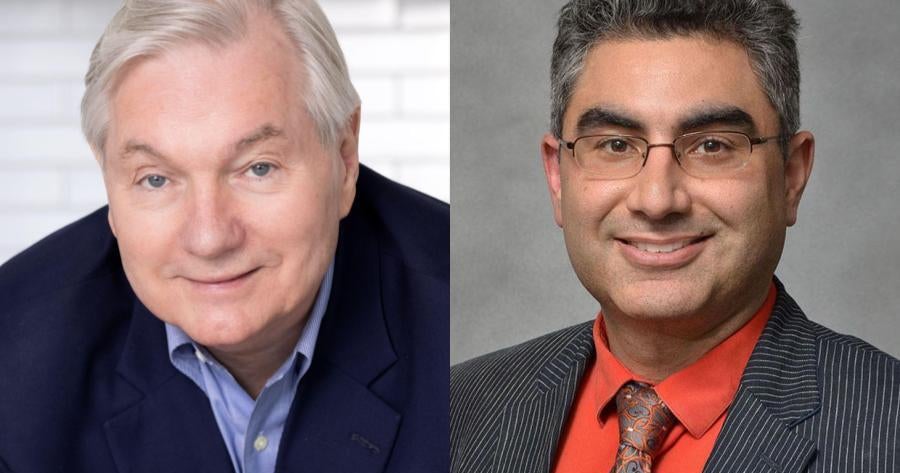Transcript: Dr. David Heymann discusses coronavirus on "Face the Nation," March 29, 2020
The following is a transcript of an interview with Dr. David Heymann that aired Sunday, March 29, 2020, on "Face the Nation."
MARGARET BRENNAN: We now go to Dr. David Heymann, a professor of epidemiology who serves as a special advisor to the World Health Organization. He joins us via FaceTime from Saverne, France. Good morning to you, doctor.
DR. DAVID HEYMANN: Good morning.
MARGARET BRENNAN: The United States is the wealthiest country in the world, and we are now the epicenter of this outbreak, does how this virus affect here- people here in America look any different to you than what it has done in the rest of the world?
HEYMANN: No, this is a pretty vicious, violent virus, and everywhere it has appeared, it's caused great numbers of people to die. And it's also spread very easily in communities. So what's happening in the US has happened around the world. What has been different is the strategies to contain the virus.
MARGARET BRENNAN: From what you're seeing, it sounds like you're suggesting the strategy to contain has not worked. I mean the White House has said now they're just trying to mitigate it.
HEYMANN: Well, the strategy works if it's started early and if it's continued even during a time when there are many cases, the objective is to identify people who are infected, either those who are sick or those who are contacts of those people who are sick, and then to isolate those people and stop transmission while at the same time having other measures, such as physical distancing and means to keep people from getting too close together.
MARGARET BRENNAN: It sounds like what you're describing is what South Korea has done.
HEYMANN: Well, that's right. Singapore, South Korea and Hong Kong have all begun a strategy very early to contain the outbreak. And they've tried to contain that outbreak with minimal disruption in their daily lives. There's a very important issue in all of these countries, and that is that people clearly understand how to protect themselves and how to protect others. They've been through the SARS outbreak. They know that they can stop this outbreak and they're working very hard to do that. So that's one of the differences. They've had SARS outbreaks before. They have learned how to not only stop transmission, but also to stock up their hospitals. So they're able to take people when they do become sick.
MARGARET BRENNAN: Would it be too early to lift some of the restrictions here in the United States as a medical professional? What is your opinion? I'm not asking about the politics.
HEYMANN: Well, at the World Health Assembly, we've been discussing with a group- the World Health Organization, we've been discussing with a group of people how best this outbreak can be stopped. And at the same time, how the lockdown procedures can be lifted. And the general consensus is that it depends on the risk assessment in the country. China has already begun to unlock its heavy industrial sector and also its small business sector. And they're watching very closely to make sure that transmission doesn't increase as a result. That's what other countries need to do as well. They need to understand where the majority of transmission is occurring and then they need to keep those sectors locked down most while unlocking the sectors where transmission is less important and heavy measures in place to stop transmission should it begin to increase again.
MARGARET BRENNAN: There was a team of British doctors who wrote this week that one of the signs of exposure to the virus is loss of taste and smell. Is that an indicator? Should Americans be looking out for that?
HEYMANN: It certainly has been an indicator in the UK and in many other countries, and I'm sure that in the US it will be the same manifestations. So yes, loss of taste has been a characteristic in some populations, but the most reliable means of determining whether or not one is infected is a fever and a persistent dry cough.
MARGARET BRENNAN: Do you have any reason to believe that once someone is infected that they then become immune? Or do you think this virus will hit in waves again and again?
HEYMANN: You know, other coronaviruses don't develop long term immunity. People can get infected with those coronaviruses that cause common colds on a regular basis. So it's very important that the immune response to this organism be studied. It's too early to say for sure. Hopefully there will be a solid immunity that develops so that vaccines can be developed that will be effective and other means of prevention will be possible.
MARGARET BRENNAN: Well, there's some talk about people developing immunity and therefore allowing them to go back into society. You're saying it's not clear yet if we can say that's a safe method. You talked about the fact that this was transferred from the animal kingdom into humans and then now spread human to human. Will animals continue spreading this disease? Or was this a one-time transmission?
HEYMANN: As far as it's understood, this was a one-time episode where an animal in nature- or even a bat in nature because this virus is very close to viruses and bats- infected a human and that human then infected others. And there was some mass event in the city of Wuhan where many, many different people were infected at the same time and sent off chains of transmission among their contacts that travelled internationally and also within China.
MARGARET BRENNAN: China shut its borders to foreigners yesterday. Would you advise other countries to do the same?
HEYMANN: It has to be a risk based assessment to really understand whether borders need to be closed. China has closed its borders because it now has more infections coming from outside China than within China itself, at least at present. And so they've decided that they want to stop this by actually closing their borders and putting people who should come in if they're infected in quarantine.
MARGARET BRENNAN: Should the Chinese Communist Party have shared more information about this virus and done it sooner?
HEYMANN: The comm- the government in China has shared information very freely with the World Health Organization and also with others. There are many published articles from Chinese investigators that have been put out on many different medical journals in front of the paywall so that everybody can understand what's going on. So there's been to date quite a free sharing of information among countries and from countries to others.
MARGARET BRENNAN: Dr. Heymann, thank you for joining us.
HEYMANN: Thank you.
MARGARET BRENNAN: We'll be right back with some thoughts on our heroic first responders.



